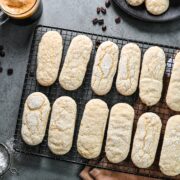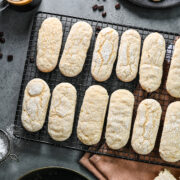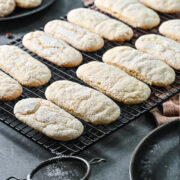Description
These vegan ladyfingers are a delicious and versatile recipe that can be used in a variety of desserts, from tiramisu to trifles and more. They're slightly chewy, crisp, and airy and hold up well when soaked in liquid. They're 100% egg-free and dairy-free, but taste just as good as the classic recipe!
Ingredients
- 2 cups all-purpose flour
- 1 cup powdered sugar, plus 1 tablespoon for dusting
- 2 teaspoons baking powder
- 1/2 teaspoon baking soda
- 1/2 teaspoon salt
- 2/3 cup aquafaba (liquid from a can of chickpeas)
- 1/4 teaspoon cream of tartar
- 1/2 cup caster sugar (superfine sugar)*
- 2 teaspoons vanilla extract
Instructions
- Preheat oven to 375˚F / 175˚C and line 2 baking sheets with parchment paper.
- In a medium-sized mixing bowl, stir together the flour, 1 cup of powdered sugar, baking powder, baking soda, and salt.
- Using a stand or handheld mixer, beat the aquafaba on medium speed until it becomes foamy, which should take about one minute. Add the cream of tartar and beat on high speed for 3 minutes.
- Scrape down the sides of the bowl and add the caster sugar to the aquafaba 1 tablespoon at time, beating for 30 seconds in between each addition. It's important to do this slowly so the aquafaba doesn't collapse and the sugar gets fully incorporated.
- Beat until stiff peaks form, about 5 minutes. Scrape down the sides with a spatula, then add the vanilla extract and beat for an additional 30 seconds.
- Gently fold the dry ingredients into the aquafaba until they're just barely combined. Don't over mix. The batter will be very thick and the aquafaba will deflate significantly – that's normal. (See blog post for photos of how the batter should look.)
- Transfer the mixture to a piping bag with a 1/2-inch diameter piping tip or a ziplock bag with a corner snipped off. Pipe the batter onto the parchment paper lined baking sheets into 3-inch strips, leaving about 1-inch between each ladyfinger, since they will flatten out and spread as they bake.
- Dust the ladyfingers with powdered sugar. Bake for 12-14 minutes, until edges are golden brown. Let cool for 10-15 minutes, then transfer to a cooling rack to cool completely before using.
Notes
*Caster sugar: This is a fine grain sugar that helps keep the batter nice and smooth, and it also keeps the aquafaba mixture from collapsing. If you don't have any caster sugar, regular granulated sugar should work, but be sure to add it very slowly to give it a chance to fully incorporate into the mixture.
Let them cool completely: Ladyfingers need to cool completely before using them in a recipe. This allows them to firm up and become slightly crispy, which is important for their texture in desserts like tiramisu.
Don't overmix the batter: Overmixing can make the cookies dense and tough, so mix just until the flour is fully incorporated into the aquafaba mixture. That said, it's also important to mix it enough – you don't want any dry flour clumps!
Storage: Store in an airtight container at room temperature or in the refrigerator for up to 5 days. Be sure to store in a sealed container, otherwise they will become stale very quickly. You can also freeze them for up to 3 months.
Gluten free: We have NOT tried this recipe with gluten free flour, so we are not 100% sure if it will turn out well. If you'd like to make this recipe gluten-free, make sure to use a 1:1 gluten free flour substitute.
Nutrition information provided is an estimate. It may vary based on cooking method and specific ingredients used.
- Prep Time: 30 minutes
- Cook Time: 15 minutes
- Category: Desserts
- Method: Oven
- Cuisine: French
Nutrition
- Serving Size: 3 cookies
- Calories: 166
- Sugar: 17.9 g
- Sodium: 164.4 mg
- Fat: 0.3 g
- Carbohydrates: 38.3 g
- Fiber: 0.7 g
- Protein: 2.6 g


